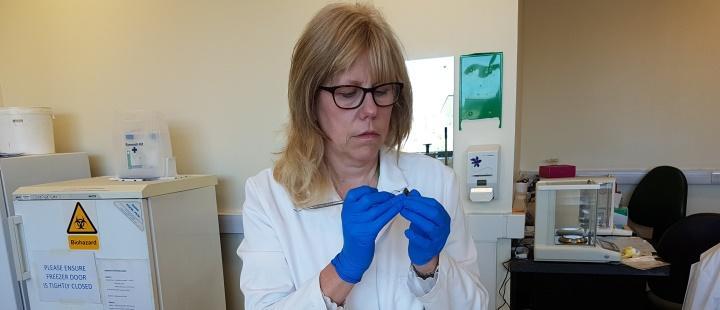The Bradford Tooth Fairy Project
Human dentine - a unique biomarker for in utero experience and nutritional stress in the womb and a predictor of health in later life?
Academic Lead: Dr Julia Beaumont
The quality of the in utero environment can affect the long-term health of an adult. From modern studies of nutritional stress we know physiological changes, as well as dietary information, are recorded in incrementally-growing tissues such as hair and fingernails through changes in the nitrogen (δ15N) and carbon isotope ratios (δ13C). Raised δ15N related to the period of starvation was identified in my study of teeth from Irish Famine victims.
The only extant tissue in the human body formed in utero is primary dentine within deciduous teeth. I have developed a novel method of analysing tiny archaeological dentine samples showing that in utero nitrogen isotope ratios are higher and wider in range than predicted: thus if high nitrogen values reflect maternal/infant stress during pregnancy this could then be used to reconstruct the diet and health of the mother, and thus the developing infant. A small pilot study of modern teeth with perinatal medical histories suggests this is the case.
Being awarded the Rank Prize New Lecturer award allows me to collect 250 exfoliated or extracted deciduous teeth together with medical histories in collaboration with Ethical Tissue and to analyse them at the Bradford isotope laboratory in order to provide proof-of-concept for a much larger study of diet and physiology during childhood. It would then be possible to use measurement of dentine as a technique to identify children at risk of disease in later life, as a forensic tool in cases of neglect, and also to study the maternal/infant health in ancient populations.
About the research
Background
This project has arisen out of my unusual career pathway: practising as dentist and orthodontist for 30 years and studying temporal isotope profiles in archaeological teeth for my research led me to combine both in a novel approach which allows me to work with specialists in both clinical and anthropological disciplines.

What do we know already?
Primary dentine in a human tooth is laid down in a regular incremental manner and does not remodel (Dean and Scandrett 1985). Like incrementally-growing tissues such as hair and fingernails, it records carbon and nitrogen isotope ratios (δ15N and δ13C) of the body at the time of formation (Müldner et al 2011). From modern studies of nutritional distress (e.g. Neuberger et al. 2013) we know that dietary and physiological changes are recorded in incrementally-growing tissues through changes in the δ15N and δ13C. In other words, δ15N and δ13C profiles in tissues such as teeth can be used to explore temporal resolution of diet and physiology retrospectively. We also know that the first 0.5mm of dentine in deciduous teeth is formed before birth and retains the isotope ratios of that period of life (AlQahtani et al 2010, Montgomery and Beaumont unpublished).
What was found
I used my technique to analyse teeth of children buried during the Kilkenny Workhouse Famine in Ireland (Beaumont et al 2013a, 2015). I found a marked difference in nitrogen levels in between those children who died early and those children who survived from Neolithic (Montgomery et al., 2013; Armit et al., 2015), Iron Age and 19th-Century Britain and Ireland (Beaumont et al., 2015). The earliest-forming dentine (which corresponds to the in utero stage) was much higher and wider-ranging than predicted from adult diets.
A small number of modern teeth have also been analysed. 16 teeth extracted as part of dental treatment at the Medical School, Khartoum, Sudan, were collected with medical histories and analysed. After NRES approval (REC reference number 14/EE/1038) 8 teeth were collected from participants of the Born in Bradford cohort study and analysed with reference to pseudonymised medical data. High nitrogen correlated to low birth weight in both studies.
Why is this important?
The Barker hypothesis states that nutrition and growth before birth (i.e. quality of life in the womb) alter the development of the foetus and therefore, are predictors of health later in life (Barker 2009) and can also affect future generations (Champagne et al., 2013). Therefore, techniques for retrospectively assessing antenatal quality of life could identify those children at higher risk of health difficulties later in life.
The potential for this as a marker for in utero malnutrition was discussed in my most recent article in the AJPA (Beaumont et al., 2015) and publicity which centered on an article in the Guardian Newspaper.
Expected outcomes
If enrichment of the δ15N in dentine could be attributed to higher individual stress levels, this could be of benefit in the assessment of the health of children during the period of growth of the teeth. Identifying children at the age of 6-7 (when the first deciduous teeth exfoliate) at risk of obesity, diabetes and heart disease using a non-invasive method could allow resources to focus preventative measures for these individuals. In a population, it could also help to promote measures to improve maternal nutrition during pregnancy. Analysis of teeth in forensic cases of nutritional neglect would be a further application.
The team
The collection of extracted teeth will be made possible by a collaboration with Dr Peter Day (School of Dentistry, University of Leeds) by Ethical Tissue and data analysis with support by Professor Mark Gilthorpe and Dr George Ellison (Division of Epidemiology and Biostatistics, Leeds Institute of Cardiovascular and Metabolic Medicine, University of Leeds). Thanks go to all the people who have donated exfoliated teeth to the study, part of my ongoing research with Dr Janet Montgomery (Durham University), and to Dr Fadil Elamin (Khartoum Medical School, Sudan) for his continuing support and donations of teeth from his patients.
The Bradford stable isotope laboratory has an international reputation and Marise Gorton, our technician, is an experienced researcher herself.
Contact
For further information please contact us at [email protected].
If you would like to donate milk teeth and complete our questionnaire, please contact Wayne Burrill at Ethical Tissue.
